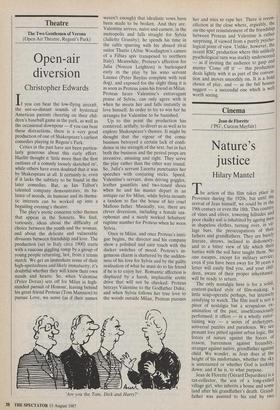Theatre
The Two Gentlemen of Verona (Open Air Theatre, Regent's Park)
Open-air diversion
Christopher Edwards
If you can bear the low-flying aircraft, the not-so-distant sounds of hysterical American parents cheering on their chil- dren's baseball game in the park, as well as the occasional downpour — if you can bear these distractions, there is a very good production of one of Shakespeare's earliest comedies playing in Regent's Park.
Critics in the past have not been particu- larly generous about this early effort. Hazlitt thought it 'little more than the first outlines of a comedy loosely sketched in', while others have even doubted that it was by Shakespeare at all. It certainly is, even if it lacks the subtlety to be found in the later comedies. But, as Ian Talbot's talented company demonstrates, its ba- lance of moods, its humour and its thema- tic interests can be worked up into a beguiling evening's theatre.
The play's erotic concerns echo themes that appear in the Sonnets. We find, variously, ideas about the difficulty of choice between the youth and the woman, and about the delicate and vulnerable divisions between friendship and love. The production (set in Italy circa 1900) starts with a raucous giggling romp by a group of young people returning, hot, from a tennis match. We get an immediate sense of their high-spiritedness and likely immaturity; it's doubtful whether they will know their own minds and hearts. So, when Valentine (Peter Doran) sets off for Milan in high- minded pursuit of Honour, leaving behind his great friend Proteus (Tom Mannion) to pursue Love, we sense (as if their names weren't enough) that idealistic vows have been made to be broken. And they are. Valentine arrives, naive and earnest, in the metropolis and falls straight for Sylvia (Juliette Grassby); he spends his time in the cafes sparring with his absurd rival suitor Thurio (Albie Woodington's cameo of a Fifties spiv transposed to northern Italy). Meanwhile, Proteus's affection for Julia (Noreen Leighton) is burlesqued early in the play by his wino servant Launce (Peter Bayliss complete with real dog), and exposed for the slight thing it is as soon as Proteus joins his friend in Milan. Proteus hears Valentine's extravagant praise of Sylvia, can only agree with it when he meets her and falls instantly in love himself. In order to try to win her he arranges for Valentine to be banished.
Up to this point the production has contrived, artfully, to divert us as well as to explore Shakespeare's themes. It might be thought that the vigour of the comic business betrayed a certain lack of confi- dence in the strength of the text, but in fact both the business and the period props are inventive, amusing and right. They serve the play rather than the other way round. So, Julia's servant Lucetta punctuates her speeches with conjuring tricks. Speed, Valentine's servant, dons driving goggles, leather gauntlets and two-toned shoes when he and his master depart in an antique car for Milan, while Sylvia mounts a tandem to flee the house of her cruel Mafioso father. Musically, too, there are clever diversions, including a female sax- ophonist and a nicely worked Schubert/ ragtime number for Proteus when he woos Sylvia.
Once in Milan, and once Proteus's intri- gue begins, the director and his company show a polished and sure touch with the darker switches of mood. Proteus's in- genuous charm is shattered by the sudden- ness of his love for Sylvia and by the guilty realisation of what he must do to his friend if he is to enjoy her. Romantic affection is displaced by a harsh, implacable erotic drive that will not be checked. Proteus betrays Valentine to the Godfather Duke, and when Sylvia follows her true love to the woods outside Milan, Proteus pursues
her and tries to rape her. There is recon- ciliation at the close where, arguably, the on-the-spot reinstatement of the friendship between Proteus and Valentine is rather surprising, if viewed from a purely psycho- logical point of view. Unlike, however, the recent RSC production where this unlikely pyschological turn was starkly underscored as if inviting the audience to gasp and mutter 'Come off it' — this production deals lightly with it as part of the conven- tion and moves smoothly on. It is a bold choice of play, and — as the full houses suggest — a successful one which is well worth seeing.


















































 Previous page
Previous page